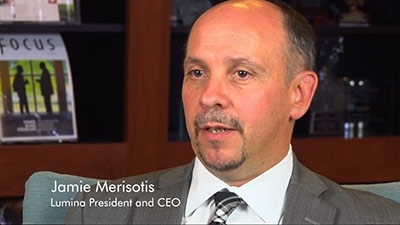Lumina President Jamie Merisotis on leadership for racial justice and educational equity in the wake of Charlottesville
There are moments that call for moral clarity and public accountability—moments that require us to affirm our core values and commit to concrete action in the face of deep threats. In the wake of shameful acts of racist violence and terrorism in Charlottesville, Virginia, this is such a moment.
Our nation has a long, sordid history of racism. At Lumina Foundation, I am privileged to work with many people who take seriously their responsibility to educate all Americans about our nation’s history—including the shameful parts that reflect racist beliefs. A battle over our nation’s historical memory and the monuments we erect was the context for demonstrations over the weekend that resulted in unspeakable violence. We must directly and forcefully denounce that violence, which was motivated by racial and ethnic hostility.
Lumina Foundation has committed to ending systemic inequalities that, throughout this nation’s history, have led to persistent and unacceptable gaps in educational opportunity and outcomes. These disparities threaten not only our economy, but the future of our democracy by eroding the moral underpinning on which our country was established.
Access to educational opportunity is inequitable in America, at least in part, because of our nation’s long history of racism. As a philanthropic organization, we collaborate with many individuals and institutions across the country who work diligently to confront and reverse the effects of this racial history. We will continue to advance this important mission, and we will speak up when we believe our voice needs to be heard.
But I am more convinced than ever we can and must do more. This call to action is true for Lumina, and it must apply to every philanthropic organization seeking to drive social change. Ensuring fair and equitable results in a country sullied by hundreds of years of systemic racism and oppression is not just a part of our collective work in philanthropy. It is the work.
With a clarity of mission, and with ample resources that give us the opportunity to actually do something, we must accept leadership and hold ourselves accountable for making a difference. Those of us in philanthropy must step up to confront not just the long-term effects of implicit biases, but the immediate and real threat of white supremacy, neo-Nazism, and racially motivated hatred.
I am honored to be the leader of a mission-driven, philanthropic organization. But I am also a white man—a father, a husband, a community member, and an American citizen who is outraged at expressions of white power and racism that didn’t begin in Charlottesville. Clearly, the nation is engaged in a searching dialogue about economic disadvantage, but it is simply not the case that whites in America are disadvantaged by the color of their skin. We need a conversation about economic opportunity for every American, but it really must begin with the need to achieve equitable results for historically disadvantaged people. We must be clear with ourselves about the realities of privilege and disadvantage—and the roots of both.
Expressions of outrage won’t stop the ongoing fight over our nation’s racial legacy. Frankly, it is frustrating to issue formal statements that seem wholly inadequate to the outrageous bigotry we continue to witness. Yes, we must speak up—standing against hate and against complacency, false equivalencies, and excuses—but we need to do so in ways that commit us to do more.
In this moment, it’s unclear how we can ever stop racism born of fear and ignorance. Some will say these enduring elements of human character will always write the darkest chapters of the human story. But our rational optimism tells us there’s hope, even in the sadness of this moment.
At Lumina, we believe postsecondary learning is critical to shared prosperity. We’ve seen first-hand the transformative effects of learning. We know that from education comes understanding—and that understanding is the first step in the healing that must take place.
Lumina Foundation can do more for racial justice and equity. And as the foundation’s president, I commit to report publicly on what we are doing, and if it is working. In the coming days and weeks, I will be talking with other foundation leaders about ways we can work together toward greater racial equity, because I believe philanthropy can and must play an important leadership role in this essential work.
In the end, we all must do more—in our workplaces, in our families, in our places of worship, in our communities. More with our resources. More with our voices. More with our actions. Our shared future depends on nothing less.
Related:
The Equity-Minded Civic Learning All Americans Need | Inside HigherEd | Sept. 25, 2017
